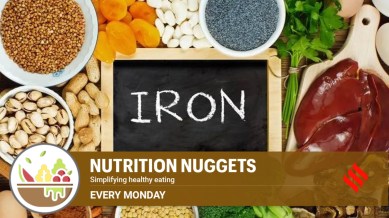Lancet study finds iron, calcium and folate deficiency among Indians: What foods should you be eating?
Their intake can be easily met from meals provided we do some smart planning

The recent Lancet study on micronutrient deficiencies across the world has some disturbing news about India. It says that people across all age groups, both men and women, are consuming inadequate amounts of micronutrients critical for health, like iron, calcium and folate.
The study is the first to provide estimates of insufficient consumption of 15 micronutrients across 185 countries, taken through diets without the use of supplements, according to an international team, including researchers from Harvard University, US.
monthly limit of free stories.
with an Express account.
Among the essential nutrients, iron, calcium and folate play critical roles in the body’s physiological functions. Iron is vital for oxygen transport and energy production, calcium is crucial for bone health and cellular function and folate (folic acid or one of the B vitamins) is essential for DNA synthesis and cell division. Yet, their intake can be easily met from meals.
WHAT ARE IRON-RICH FOODS?
Iron is a key component of haemoglobin, the protein in red blood cells responsible for transporting oxygen throughout the body. Iron is available in two forms: heme and non-heme. Heme iron is found in animal products.
Animal Sources of Iron: These include red meat, poultry, seafood, particularly clams, oysters and mussels, organ meats like liver and kidney.
Plant-Based Sources of Iron: Legumes, lentils, chickpeas and beans are excellent sources of non-heme iron. Pairing them with vitamin C-rich foods like tomatoes or citrus fruits can enhance iron absorption.
Dark leafy greens: Spinach, kale, and Swiss chard are packed with iron though they also contain compounds that can inhibit absorption. Cooking these greens can reduce these inhibitors.
Nuts and seeds: Pumpkin seeds, sesame seeds and cashews are good sources of non-heme iron.
Fortified foods: Many cereals, bread and plant-based milk alternatives are fortified with iron, making them valuable additions to the diet.
WHAT ARE CALCIUM-RICH FOODS?
Calcium is the most abundant mineral in the body, essential for building and maintaining strong bones and teeth. It also plays a crucial role in nerve transmission, muscle function and blood clotting. Inadequate calcium intake can lead to osteoporosis, a condition characterized by brittle and fragile bones.
Dairy Sources of Calcium: Whole, low-fat, and skim milk are all rich in calcium. A versatile food, yogurt is not only high in calcium but also contains probiotics that support gut health. Cheese varieties like cheddar, mozzarella and ricotta are rich sources of calcium.
Non-Dairy Sources of Calcium: Soy products like tofu and tempeh are often fortified with calcium and provide a plant-based option for those avoiding dairy.
Dark leafy greens: Cooking kale, collard greens and bok choy can improve calcium absorption.
Almonds: These nuts are not only rich in calcium but also provide healthy fats and fibre.
Fortified plant-based milk: Almond, soy and oat milk are often fortified to match the levels found in cow’s milk.
FOLATE-RICH FOODS
Folate, a B-vitamin, is essential for DNA synthesis, cell division and proper brain function. It is particularly crucial during pregnancy, as it helps prevent neural tube defects in developing foetuses. Folate deficiency can lead to megaloblastic anemia, characterized by large, abnormal red blood cells.
Vegetable Sources of Folate: Go for dark leafy greens like spinach, romaine lettuce and turnip greens. Asparagus is not only rich in folate but also provides fibre, antioxidants and vitamins A, C, and K. Broccoli is another source.
Fruit Sources of Folate: Oranges, lemons, and grapefruits are high in folate. Avocado is a good combination fruit with folate, healthy fats, and other vitamins.
Legumes: Lentils and chickpeas are particularly high in folate and provide a plant-based protein source.